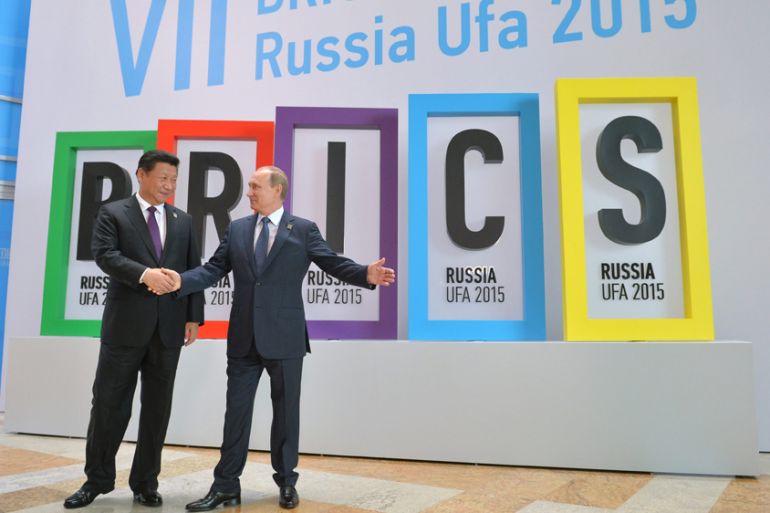A Sino-Russian alliance to rival Europe
Faced with Western sanctions and falling oil prices, Russia bolsters ties with trade-partner to the east.

Moscow, Russia – This nameless, secret market in southeastern Moscow is only known to Chinese expatriates and foodie Muscovites.
Hidden outside the sprawling Sadovod wholesale centre, it consists of two dozen shops where one can buy Chinese spices, sauces, and vegetables. Some traders speak broken Russian, and all of them object to having their photos taken.
Keep reading
list of 4 itemsWhat’s slowing down America’s clean energy transition? It’s not the cost
Global coal use to reach record high in 2023, energy agency says
COP28 Dubai is over: Four key highlights from the UN climate summit
They have a reason to be weary – Chinese labour migrants are feared as potential “colonisers” in Russia, whose dwindling population of 143 million occupies an area the size of the US and Australia combined.
Russia’s border with China stretches for 4,200km, and the two nations almost started a war in 1969 over a tiny island during the Sino-Soviet Border Conflict.
|
|
| Building BRICS influence? |
But the post-Soviet Kremlin is beginning to embrace Beijing as a new strategic ally, turning its back on the West, the traditional magnet for its political ambitions, cultural influences and hydrocarbon exports.
The alliance heralds a political makeover of Eurasia and challenges the post-Cold War, US-dominated world order, some analysts predict.
“Moscow is now closer to Beijing than to Berlin,” claims Dmitri Trenin of the Carnegie Moscow Center.
“For China, peacefully gaining pre-eminence in Eurasia will bring it closer to assuming its rightful place in the world,” Trenin wrote in April.
“The United States, which even 15 or 20 years ago could claim to be the Eurasian hegemon, will be watching from the sidelines,” he added.
The alliance has already resulted in one of the largest energy deals in history, joint naval drills in the East China Sea and the Mediterranean, and pledges to fight terrorism in Central Asia and China’s Xinjiang.
Moscow sells advanced weapons to Beijing, and China’s Shenzhou “divine vessel” is based on the Soviet-designed Soyuz spaceship.
The catalyst

Russia has for centuries tried to be accepted into the European “family of nations”, and after the 1991 Soviet collapse, Moscow sought to forge a geostrategic alliance with Berlin that would rely on Russian resources and German technologies to respond to Washington’s supremacy.
But last year, the West slapped sanctions on Moscow over Ukraine, blocking access to credits and technologies. Meanwhile, falling oil prices crashed the rouble and crimped Russia’s economic growth.
Moscow realised that its status of an “energy superpower” that imposes its political will on Europe and ex-Soviet republics by granting or blocking access to its pipelines, was simply a mirage.
RELATED: Russia: From oil curse to sanctions
The West served as a catalyst for Russia’s pivot to China.
“So far, a limit has been set – neither Russia nor China want to create a full-fledged alliance aimed at the West, at the US,” Sinologist Yakov Berger of the Far East Institute in Moscow told Al Jazeera.
Redirecting hydrocarbon flow
Moscow has repeatedly threatened the EU with diverting the flow of its oil and gas to the Far East – omitting the fact that the Kremlin’s pockets are simply not deep enough for the investment.
China’s are – but instead of the two dozen nations that have been consuming Russian hydrocarbons for decades via Soviet-built pipelines, Moscow will have to deal with a picky customer that calls the shots.
“The Chinese are tough negotiators,” Gennady Shmal, president of the Union of Oil and Gas Producers of Russia, told Al Jazeera.
In June, Russia became China’s largest oil supplier, leaving Saudi Arabia and Angola behind.
It now exports more than 30 million tonnes of crude a year to China – about 15 percent of its output, accepts yuans instead of dollars, and imports equipment and materials used in oil production.
“Considering the sanctions, China is the most interesting country to supply the equipment and materials,” Shmal said.
The alliance began because competitive contradictions and even conflicts related to their positions in Central Asia emerged. But they solve such conflicts by becoming allies.
Last May, Moscow and Beijing struck a historic, $400bn accord to supply up to 38 billion cubic metres of gas to China annually for 30 years. But the yet-unsold amount is less than a fourth of the nearly 160 billion cubic metres Russia’s monopolist Gazprom sold internationally in 2014 – mostly to Europe.
The deal has been criticised for the astronomical – up to $70bn – cost of the pipeline that will reach China’s northeastern Heilongjiang province.
Ironically, this is where the nations almost started a war in 1969 – ending a Sino-Soviet pact formed 20 years earlier, when Moscow-backed communists seized power in war-torn China and embraced the USSR as an “elder brother”.
Disputed region
When selling its hydrocarbons to China, Moscow also has to compete with ex-Soviet Central Asia.
Turkmenistan, Uzbekistan, and Kazakhstan already sell their natural gas via three Chinese-built pipelines, and Kazakhstan has also been pumping its Caspian oil to northeastern China since 2006.
Central Asia is also the biggest bone of contention between the nations. Russia still considers the Muslim region its “soft underbelly”, while China sees it as its “Wild West”, a source of hydrocarbons, raw materials, and a market with more than 50 million customers.
Surprisingly, it was competition over Central Asia that spurred the rapprochement, analysts say.
“The alliance began because competitive contradictions and even conflicts related to their positions in Central Asia emerged,” Moscow-based political analyst Alexei Mukhin told Al Jazeera.
“But they solve such conflicts by becoming allies,” he added.
Central Asia is the focus of both nations’ most ambitious projects.
The Moscow-led Eurasian Economic Union, which includes Kazakhstan and Kyrgyzstan, is widely seen as a reincarnation of the USSR.
China’s gargantuan Silk Road Economic Belt is expected to surpass the original trade route with the construction of railroads, highways, pipelines, and border crossings from Pakistan to Poland.
At the BRICS summit held in the western Russian city of Ufa in mid-July, Chinese and Russian officials pledged to “dock” both projects and “create a new heartland”.
Central Asia has also become the focus of the most ambitious geopolitical bloc the world has seen since the Cold War’s end. The BRICS summit coincided with the less-trumpeted meeting of the Shanghai Cooperation Organisation (SCO).
Formed in 2001 by Russia, China, and four Central Asian nations to settle border disputes, the focus quickly morphed into a security group that occupies three-fifth of Eurasia and is home to a fifth of the world’s population.
|
|
| Russian government focuses on Chinese tourists |
India and Pakistan – home to another fifth of the world’s population – agreed to join the group at the Ufa meeting.
Not exactly a honeymoon
Despite the publicised handshakes and accords, the Russia-China partnership is far from equal.
Beijing is not in a hurry to defend Moscow on all fronts. Although China opposed the Western sanctions over Ukraine, it has not recognised Russia’s annexation of Crimea.
Russia resists China’s initiative to create an SCO bank and turn member states into a free-trade zone fearing the move will hurt its industries and exports.
Chinese nationalists have phantom pains over the loss of huge swaths of land czarist Russia cut off from imperial China without firing a single shot some 150 years ago.
Beijing is Moscow’s second largest trading partner after the EU – but Russia accounts for less than 3 percent of China’s total trade.
Unsurprisingly, Russia can no longer play “the elder brother” – and can hardly lead the dance.
“Will [Moscow] agree to a subordinate role and what the role will be – depends very much on how China acts and, again, how the West acts,” Sinologist Berger said.